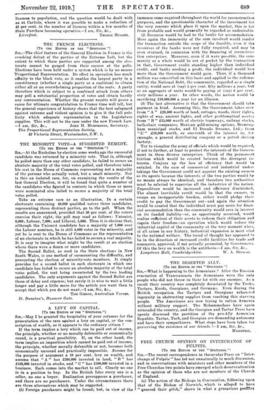A LEVY ON CAPITAL.
[To THE EDITOR OF THE " SPECTATOR:9 SIR,—May I be granted the hospitality of your columns for the presentation of the case against a levy on capital, or the conscription of wealth, as it appears to the ordinary citizen ?
If the term implies a levy which can be paid out of income, the principle, whether or no morally defensible or economically sound, is a practical possibility. If, on the other hand, the term implies an imposition which cannot be paid out of income, the principle, whether morally defensible or not, becomes both economically unsound and practically impossible. Assume for the purpose of argument a 10 per cent. levy on wealth, and assume that " A " has £200,000 invested in land, "B " has £150,000 invested in stocks, and "C " has £100,000 invested in a business. Each comes into the market to sell. Clearly no one is in a position to buy. In the British Isles every one is a seller, no one a buyer. Realization presupposes a purchaser, and there are no purchasers. Under the circumstances there are three alternatives which may be suggested.
. .(1) Foreign purchasers might be found; but, in view of the immense sums required throughout the world for reconstruction purposes, and the questionable character of the investment for the very reasons which place it upon the market, this is far from probable and would generally be regarded as undesirable.
(2) Recourse would be had to the banks for accommodaticu. Here again the immensity of the sum involved would render the transaction outside the scope of the feasible, even if the resources of the banks were not fully required, and may be even strained, in connexion with the financing of reconstruc tion enterprises. Moreover, even if it were possible, the com munity as a whole would be out of pocket by the transaction in that, Government credit standing higher than individual credit, and banks needing a profit, the individual would lose more than the Government would gain. Thus, if a thousand million was conscribed on this basis and applied to the redemp tion of the National Debt, the community, regarded as a single entity, would save at (say) 5 per cent. fifty millions a year, but as an aggregate of units would/ be paying at (say) 6 per cent. sixty millions a year. In other words, the nation would he sacrificing £10,000,000 a year for an illusion.
(3) The last alternative is that the Government should take payment in kind. Assuming this, the Government takes over from " A " £20,000 worth of land, cottages, woods, river right:, rights of way, ancient lights, and other problematical assets; from " B " £15,000 worth of electric tramways, railway stocks, bath-chair companies, Mexican gold-mining options, Birmingham municipal stocks, and El Dorado Dreams, Ltd.; from " £10,000 worth, or one-tenth of the interest in, for example, a general distributing company or a potted shrimp factory.
Try to visualize the army of officials which would be required. if not to further, at least to protect the interests of the Govern ment in these diverse enterprises. Think of the permanent friction which would be created between the divergent interests. Conjure up the loss of efficiency that would be entailed. In the case of commercial and industrial undertakings the Government could not appoint the existing owners as its agents because the interests of the two parties would by no means always be identical, and therefore two authorities must be salaried to supervise all the industries of the nation. Expenditure would be increased and eiReiepcy diminished. The almost inevitable result would be that the owners, to escape an insupportable burden, either would pledge their credit to pay the Government out—and again the situation would be created that the individual must pay more for financial accommodation than the community would save in interest on its funded liability—or, as opportunity occurred, would realize sufficient of their assets to redeem their obligation and regain their freedom—an operation which would reduce the industrial capital of the community at the very moment when. of all crises in our history, industrial expansion is most vital to the national welfare. The trend of thought has appeared to be in the direction of increased credit facilities for trade and commerce, approved, if not actually promoted, by Government. Of this the levy on wealth is the antithesis.—I am, Sir, &e.,
Longstowe Hall, Cambridgeshire. W. A. BRIS( UE.






































 Previous page
Previous page